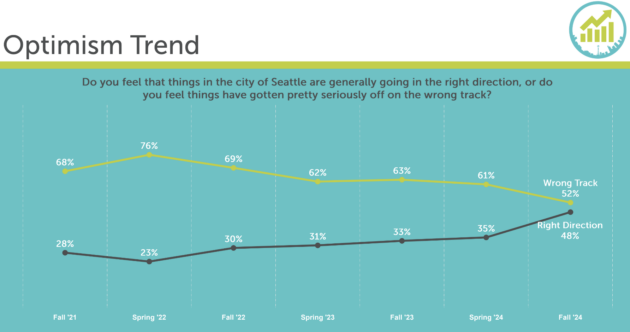Seattle residents are increasingly optimistic about city’s future, according to new survey
Seattleites aren’t as pessimistic about their city.
That’s one takeaway from a new survey of 700 registered voters, commissioned by the Seattle Metro Chamber of Commerce and conducted by EMC Research from September 5-15.
The survey found that 48% of respondents say the city is “going in the right direction” — that’s up from 30% two years ago.
A quality of life “index” calculated by survey responses reached 4.66, on a scale from 1-10 (10 being positive) — up from 3.89 two years ago.
The survey also found that fewer people (46%) are considering leaving Seattle.
The results reflects a notable shift from a few years ago, when the city was trying to bounce back from the pandemic.
Seattle Chamber of Commerce President and CEO Rachel Smith said that the survey is conducted “because quality of life underlies attracting and retaining employees to move here or to stay here.”
“Employers and their employees live and work and recreate and vote here — and it impacts the decisions of business owners to decide to stay or to locate here,” she said in a call with reporters Tuesday.

The top three concerns facing the city are “crime/drugs/public safety,” “homelessness,” and “cost of living/affordable housing,” according to respondents.
More residents feel safe about visiting downtown, according to the survey. But a majority (81%) say they are worried about the future of the downtown core, where office vacancies rates continue to increase as companies, including many tech firms, have shifted to hybrid or remote work policies.
Smith said improving public safety on the streets of downtown Seattle is key to helping attract more workers and companies.
She also pointed to getting employees back in their offices.
“Kudos to Amazon and others who are doing that,” Smith said. Amazon, the city’s largest employer, recently told corporate workers to return to the office five days per week, starting in January.
Seattle Mayor Bruce Harrell announced this summer that it will increase the required number of days for in-office work for executive branch employees from two days to three starting this fall. The move will impact more than 13,000 workers.
Regional public and private employers such as King County and Sound Transit also announced plans to adjust in-person policies.
Bringing back workers more frequently “does not mean we have to abandon flexibility for our employees,” Smith said. “But it does mean that humans are an essential element to the places that we want to be, and we need more of them here.”
The survey also included questions about taxes, and about two-thirds of respondents said the city should not consider tax increases to address its $230 million deficit.
Mayor Harrell last month released his planned 2025-26 budget, which includes a plan to siphon off money from the city’s payroll tax on big businesses to plug budget holes.
See the full survey results here.
The survey noted that registered voters are more likely to be younger, progressive, renters, new to the city, and be people of color. The survey data was weighted by key demographic variables to accurately reflect the registered voter population.

